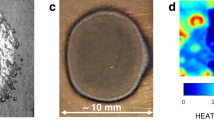Abstract
Boiling of extremely superheated liquids will be discussed as critical phenomenon. A consistent description including the kinetics of the phase transition can be deduced from a variational principle. In contrast to classical nucleation theory, the spatial extension of critical nuclei increases with increasing superheating, but the energy needed to form a vapour nucleus decreases and vanishes at the spinodal. The boiling process exhibits an equivalence to a phase transition of second order and the appearing critical indices obey the corresponding scaling laws.
Similar content being viewed by others
Author information
Authors and Affiliations
Additional information
Received on 7 April 1998
Rights and permissions
About this article
Cite this article
aus der Wiesche, S., Rembe, C. & Hofer, E. Boiling of superheated liquids near the spinodal: I General theory. Heat and Mass Transfer 35, 25–31 (1999). https://doi.org/10.1007/s002310050294
Issue Date:
DOI: https://doi.org/10.1007/s002310050294



